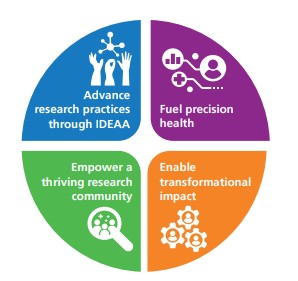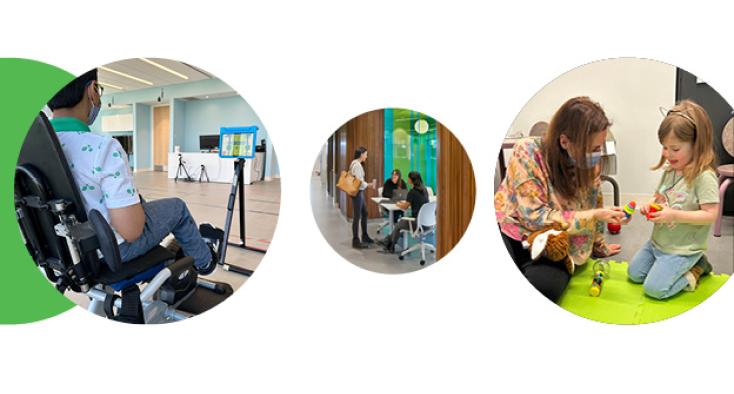Welcome to the Bloorview Research Institute
The Bloorview Research Institute (BRI) is embedded within Holland Bloorview Kids Rehabilitation Hospital, Canada’s largest pediatric rehabilitation hospital that is fully affiliated with the University of Toronto. It has ranked amongst Canada’s top 40 research hospitals for more than a decade. The institute is the only university-affiliated research institute in Canada dedicated to pediatric disability and one of very few around the world.
BRI brings together teams of top researchers and trainees from a wide array of disciplines including physicians, psychologists, allied health professionals, engineers, neuroscientists, sociologists and even urban planners. Together, they work collaboratively with the community to co-design and conduct transformative, clinically relevant research focused on childhood onset disability, injury and developmental diversity.
Watch this video to see the BRI in action!
Our Vision
To be a global leader in transformative, equity-driven research dedicated to enabling personalized versions of a good life across the lifespan, for all individuals with childhood onset disabilities, acquired injuries and developmental differences, their families and communities.
Our Mission
Through trusted, diverse and transdisciplinary local, national and international partnerships and co-design with children, youth, families and communities, we will:
- advance the understanding of disability and developmental differences to promote physical and mental health, participation and wellbeing across the lifespan.
- propel precision health discoveries through data science, integrating biological, psychological and social aspects of health and wellness.
- mobilize knowledge and evidence-based practices, technologies, treatments and interventions nationally and globally.
- use an inclusion, diversity, equity, accessibility and anti-racism (IDEAA) informed approach in all of our work.
- empower and support research teams by providing the resources, skills and technology required to inspire research excellence and impact.
BRI Strategic Priorities 2023 to 2030
Built on the voices of over 100 scientists, investigators, researchers, research staff, trainees, hospital leadership, youth and families, and advocacy groups and aligned with the hospital’s Holland Bloorview 2030 strategic plan, BRI’s four strategic priorities will guide our work for the next seven years.

Co-create inclusive, diverse, equitable, accessible and anti- racist research practices that confront inequities across all stages of the research lifecycle, from training, hiring and promotions to study design, recruitment and dissemination.
- Increase diversity of staff and trainees and establish career building employment and learning opportunities for structurally disadvantaged staff and trainees
- Actively address barriers to research participation and promote greater access to children, youth and families from historically under-represented communities
- Integrate IDEAA principles in research to address inequities arising from the intersections of disability and other marginalized and other structurally disadvantaged individuals and communities
Conduct research powered by data science and artificial intelligence (AI) to advance precision health solutions that consider the interconnection between biology, psychology, and socio-environmental factors for individuals with childhood onset disability, acquired injury and developmental differences.
- Build the infrastructure to securely and ethically collect, link and use internal and external, clinical and research data
- Advance the understanding of the variability within and across individuals, including biology, behavior, environment, and experiences to inform personalized solutions
- Support the development of a learning health system to promote best possible care outcomes
Co-create a supportive, meaningful and collaborative work environment where well-being, psychological safety and belonging are promoted and excellence, growth and development can flourish.
- Support diverse career pathways through mentorship, training, collaboration/partnership and opportunities for progression
- Reduce administrative burden to increase staff engagement, sustainability, impact and overall joy in work
- Value diverse and varied research contributions that impact the health and wellbeing of children, youth and families
Propel transformative discoveries into public discourse to empower widespread access to the evidence needed to support optimal health, development, wellbeing and participation across settings, locally, nationally and internationally.
- Build expertise in implementation science to promote the uptake and spread of research findings into care, policy and practice
- Prioritize and incentivize knowledge mobilization and commercialization efforts to maximize the benefit of discoveries, interventions and tools for all those that need them when they need them
- Build, trusted, transparent and mutually beneficial partnerships globally with academia, government, industry, community providers, marginalized communities, clinicians, families, children and youth to co-design and inform clinical practice, policy development and system change
